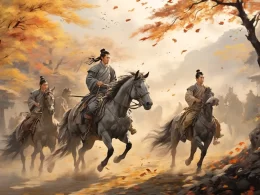Idiom Explanation:
It is a metaphor for being trapped in a predicament where one is surrounded by enemies on all sides and isolated.
Pronunciation:
四面楚歌
sì miàn chǔ gē
Origin:
汉·司马迁《史记·项羽本纪》:“项王军壁垓下,兵少食尽,汉军及诸侯兵围之数重。夜闻汉军四面皆楚歌,项王乃大惊,曰:‘汉皆已得楚乎?是何楚人之多也。’”
Story:
In 202 B.C., Qin Shi Huang established China's first unified feudal dynasty. The Terracotta Warriors and Horses of Qin Shi Huang in Shaanxi, China, a World Heritage Site today, are remnants of the Qin Dynasty. Another World Heritage Site, the Great Wall of China, also took shape during the Qin Dynasty.
As the rulers of the Qin Dynasty were so pleased with themselves, especially the Qin Shi Huang who built a luxurious palace and tomb for himself and spent a great deal of money on the palace, the people were exploited so cruelly that peasant revolts broke out all over the country one after another. As a result, the Qin Dynasty fell after only 15 years of rule. After the fall of the Qin Dynasty, there were two main forces competing for the rule of the new country, one led by Xiang Yu and the other by Liu Bang.
Xiang Yu was a general from the land of Chu who was fierce, arrogant, brave and warlike. Liu Bang was a low-ranking bureaucrat before the destruction of the Qin Dynasty, with a somewhat cunning character, but knew people well. During the war against the Qin dynasty, the two men had become brothers and showed solidarity with each other. After the fall of the Qin Dynasty, the two gradually turned against each other.
Initially, Xiang Yu had the absolute advantage. He made himself "King of Western Chu", which was equivalent to the role of an emperor, while Xiang Yu made Liu Bang "King of Han", which was only equivalent to a vassal king. In order to preserve his power, Liu Bang recognized Xiang Yu's dominance on the surface, but secretly recruited talents and developed his military power. Gradually, Liu Bang and Xiang Yu became evenly matched.
Later, Xiang Yu and Liu Bang agreed to use the east and west sides of Honggou (Jialu River in the territory of Rong County, Henan Province) as the boundary and not to infringe on each other. But Liu Bang, who had grown in appetite, changed his thinking of "divide and rule" after the advice of Zhang Liang and Chen Ping, and thought he should destroy Xiang Yu while he was weak. So he joined forces with Han Xin, Peng Yue and Liu Jia to pursue Xiang Yu's troops who were heading east to Pengcheng (modern Xuzhou, Jiangsu). After some fierce battles, Liu Bang's army surrounded Xiang Yu and his army at Gaixia (in present-day Anhui province). At this time, Xiang Yu was at a disadvantage, but he still had 100,000 troops, so Liu Bang could not destroy Xiang Yu at once.
One night, Xiang Yu and his soldiers heard a familiar song around them. When they listened carefully, it was the folk song of his hometown Chu. The song came from Liu Bang's camp. Xiang Yu and his soldiers were very surprised, thinking that Liu Bang had already captured their hometown and taken many of their relatives as captives, and this familiar song also aroused the soldiers' homesickness. Xiang Yu's army was in turmoil and the soldiers fled by night, leaving only a few hundred of them.
It turned out that this was a ploy made by Liu Bang. Liu Bang organized his own soldiers to sing those sentimental Chu folk songs, just to destabilize Xiang Yu's army. In this situation, Xiang Yu lost his fighting spirit, so he drank inside the tent and sang with his favorite concubine, Yu Ji. After singing, he shed tears, and the people around him were so sad that they couldn't lift their heads up. After a while, Xiang Yu mounted his horse and took his remaining 800 cavalrymen and decided to break out from the south, fighting as he fled. When Xiang Yu reached the Wu River, only 28 men were left. He felt ashamed to see the father and mother of Jiangdong, so he killed himself. Liu Bang took over the world.
In this story, Xiang Yu was surprised to hear the Chu song sung around him, and then he was defeated and killed himself, so people later used the phrase "Chu song on all sides" to describe the situation where people were attacked or forced from all sides, and were trapped in a difficult situation.
Similar Idioms:
- 腹背受敌
- 十面埋伏












